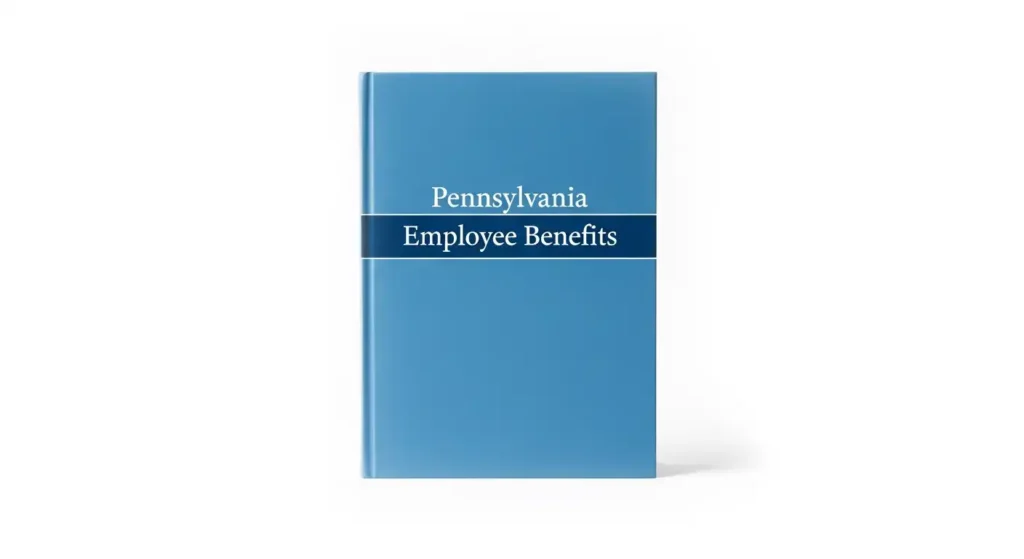Free Pennsylvania Mandatory Employee Benefits Generator
Pennsylvania Mandatory Employee Benefits Report Generator
This tool generates a customized report outlining the mandatory employee benefits your company must provide under federal, Pennsylvania state, and local laws. Please provide the following details to create your custom compliance document.
Download Your Report 📄
Instructions for Google Docs / PDF
- Click the "Prepare for Download" button below. This will open your customized report in a new, clean browser tab.
- To save as a PDF: In the new tab, press Ctrl + P (on Windows) or Cmd + P (on Mac) to open the print dialog. Change the destination to "Save as PDF" and save the file. You can then upload this PDF to Google Drive.
- To copy into Google Docs: In the new tab, press Ctrl + A (or Cmd + A) to select all the text. Then press Ctrl + C (or Cmd + C) to copy it. Open a new Google Doc and press Ctrl + V (or Cmd + V) to paste. The formatting will be preserved.
Disclaimer: This generator provides general compliance information based on your inputs and is not legal, tax, or HR advice. Laws and thresholds (federal, Pennsylvania, and local ordinances such as Philadelphia and Pittsburgh) change and may not be fully reflected. Use of this report does not create an attorney–client relationship. Verify all results with official sources and consult a qualified professional before acting.
Found our Free Pennsylvania Mandatory Employee Benefits Generator useful? Bookmark and share it.

The Foundational Framework of Mandatory Benefits in Pennsylvania
Introduction to the Tri-Layered System of Compliance
Employers operating within the Commonwealth of Pennsylvania are subject to a complex and multi-layered framework of legal obligations concerning employee benefits. Compliance requires navigating an intricate web of federal statutes, state-specific laws, and a growing number of municipal ordinances. This creates a tiered system of regulation where the most stringent requirement—whether federal, state, or local—is the one that must be followed.
A critical aspect of this legal landscape is the dynamic interplay between these layers. Federal laws, such as the Family and Medical Leave Act (FMLA) and the Affordable Care Act (ACA), establish a national baseline of employee rights and employer responsibilities. Pennsylvania state law then adds another layer of specific mandates, such as the requirement to provide Workers' Compensation insurance and job-protected, albeit unpaid, leave for civic duties like jury service. The final and often most complex layer is composed of local ordinances enacted by municipalities. In Pennsylvania, the economic hubs of Philadelphia and Pittsburgh have become particularly active in legislating employee benefits, most notably through the creation of mandatory paid sick leave laws.
Defining "Benefit": A Legal and Practical Taxonomy
To navigate this environment effectively, it is essential to deconstruct the term "employee benefit" into distinct legal and practical categories, as each is governed by different statutes and carries unique compliance obligations.
- Statutory Payroll Contributions: These are legally required deductions and employer-paid taxes that fund social insurance programs like Social Security and Medicare through the Federal Insurance Contributions Act (FICA).
- Mandated Insurance Programs: These are state-administered, employer-funded programs like Workers' Compensation and Unemployment Compensation.
- Job-Protected Leave: This encompasses legal guarantees that an employee can take time off for specific reasons without fear of termination, such as under the federal FMLA or for state-mandated jury duty. Much of this leave is unpaid.
- Mandated Paid Leave: This is driven entirely by municipal ordinances in Pennsylvania, with Philadelphia and Pittsburgh leading the way on paid sick and safe time leave.
- Discretionary Benefits: These are benefits not legally required but can become legally enforceable once promised in a contract or formal policy. This includes paid vacation, severance pay, and retirement plans.
The following table provides a high-level summary of the primary mandatory benefits in Pennsylvania.
| Benefit Type | Governing Law | Employer Coverage Threshold | Benefit Nature | Key Administrative Body |
|---|---|---|---|---|
| Social Security & Medicare | Federal (FICA) | All Employers | Payroll Contribution | Social Security Administration / IRS |
| Unemployment Insurance | Federal (FUTA) / State (PA UC Law) | Most Employers | Employer-Paid Tax | PA Dept. of Labor & Industry (L&I) |
| Workers' Compensation | State (PA WC Act) | Nearly All Employers | Employer-Paid Insurance | PA L&I, Bureau of Workers' Comp. |
| Health Insurance (ACA) | Federal (ACA) | 50+ Full-Time Equivalent Employees | Employer/Employee Shared Cost | IRS / U.S. Dept. of Labor (DOL) |
| Family & Medical Leave | Federal (FMLA) | 50+ Employees (within 75 miles) | Unpaid, Job-Protected Leave | U.S. DOL, Wage and Hour Division |
| Health Coverage Continuation | Federal (COBRA) / State (Mini-COBRA) | 20+ Employees / 2-19 Employees | Employee-Paid Premium | U.S. DOL / PA Insurance Dept. |
| Jury Duty Leave | State (42 Pa. C.S. § 4563) | Varies by Industry Size | Unpaid, Job-Protected Leave | Pennsylvania Courts |
| Military Leave | Federal (USERRA) / State (51 Pa. C.S.) | All Employers | Unpaid, Job-Protected Leave | U.S. DOL / PA Courts |
| Crime Victim & Witness Leave | State (18 Pa. C.S. § 4957) | All Employers | Unpaid, Job-Protected Leave | Pennsylvania Courts |
| Paid Sick & Safe Leave | Local (Philadelphia Ordinance) | 10+ Employees (Paid); <10 (Unpaid) | Paid/Unpaid Leave | Philadelphia Dept. of Labor |
| Paid Sick Leave | Local (Pittsburgh Ordinance) | All Employers | Paid Leave | City of Pittsburgh |
Legally Mandated Insurance and Social Security Programs
A significant portion of mandatory benefits consists of employer-funded insurance programs and payroll contributions that form the bedrock of the social safety net. These represent a substantial, non-discretionary cost and administrative responsibility for employers.
Workers' Compensation
The Pennsylvania Workers' Compensation Act mandates that nearly every employer in the Commonwealth provide no-fault insurance coverage for employees' job-related injuries or illnesses. Employers can meet this obligation by purchasing a policy from a private carrier, the State Workers' Insurance Fund (SWIF), or by self-insuring if they meet strict financial criteria. Failure to carry required insurance can result in severe penalties, including fines and criminal charges.
Unemployment Compensation
Pennsylvania's Unemployment Compensation (UC) program provides temporary wage replacement to individuals who lose their jobs through no fault of their own. It's funded almost entirely by employer-paid taxes at both state (SUTA) and federal (FUTA) levels. An employer's state tax rate is determined by an "experience rating," incentivizing stable employment. In 2024, employer contributions range from 1.42% to 10.37% on the first $10,000 of each employee's wages.
Federal Insurance Contributions Act (FICA)
Under FICA, all employers must withhold payroll taxes from employee wages and pay a matching contribution to fund Social Security and Medicare.
- Social Security: 6.2% for the employee and 6.2% for the employer on wages up to the annual limit ($168,600 for 2024).
- Medicare: 1.45% for the employee and 1.45% for the employer, with no wage limit.
Health Care and Medical-Related Mandates
The landscape of mandatory health benefits is primarily defined by federal law and an employer's size. Crossing the 20- and 50-employee thresholds, in particular, represents major inflection points that trigger new legal requirements.
The Affordable Care Act (ACA)
The ACA's "employer mandate" applies to Applicable Large Employers (ALEs)—businesses with 50 or more full-time equivalent employees. ALEs must offer affordable, minimum-value health coverage to at least 95% of their full-time employees and their dependents. Failure to comply can result in substantial IRS penalties. ALEs also have extensive annual reporting obligations through Forms 1094-C and 1095-C.
The Family and Medical Leave Act (FMLA)
Pennsylvania does not have its own state-level family and medical leave law, so the federal FMLA governs. It applies to private employers with 50 or more employees within a 75-mile radius. Eligible employees can take up to 12 weeks of unpaid, job-protected leave in a 12-month period for qualifying family and medical reasons, including the birth of a child, a serious health condition, or caring for a family member. Employers must maintain the employee's health benefits during FMLA leave.
Health Insurance Continuation (COBRA and Mini-COBRA)
Laws require employers to offer continuation of health coverage after a qualifying event. The applicable law depends on employer size:
- Federal COBRA: Applies to employers with 20 or more employees. Coverage typically lasts for 18-36 months, with the beneficiary paying up to 102% of the premium.
- Pennsylvania's "Mini-COBRA": Applies to employers with 2 to 19 employees. It provides up to nine months of continuation coverage, with the beneficiary paying up to 105% of the premium.
Job-Protected Leaves of Absence
Pennsylvania state law provides several job-protected leaves, primarily for civic duties. A consistent theme is that they secure an employee's job but do not mandate pay, shifting the financial burden of the absence onto the employee.
Jury Duty Leave
Under Pennsylvania law, employers are prohibited from taking adverse action against an employee for serving on a jury. The law explicitly states that employers are not required to pay employees for time lost to jury service. However, this job protection does not apply to smaller businesses, including retail/service businesses with fewer than 15 employees and manufacturing businesses with fewer than 40 employees.
Military Leave
Both the federal Uniformed Services Employment and Reemployment Rights Act (USERRA) and state law protect employees who serve in the military. These laws prohibit discrimination and provide broad reemployment rights. A key federal court ruling with jurisdiction over Pennsylvania has interpreted USERRA to require paid leave for short-term military service if the employer provides paid leave for other comparable absences like jury duty or bereavement.
Crime Victim and Witness Leave
State law protects employees who must miss work to participate in the criminal justice process as a victim, a witness, or a family member of a victim. The leave is job-protected but unpaid.
The Impact of Municipal Ordinances: A Patchwork of Paid Leave
The absence of statewide paid sick leave legislation has led to a fragmented compliance environment, with Philadelphia and Pittsburgh enacting their own comprehensive ordinances. An employee's right to paid sick leave is determined by their workplace address, forcing multi-location employers to adopt location-specific policies.
Philadelphia's Worker Protection Laws
Philadelphia's "Promoting Healthy Families and Workplaces" ordinance requires sick leave for nearly all employees working in the city. The recent Protect Our Workers, Enforce Rights (POWER) Act, effective May 2025, significantly expanded these protections. The law now includes "safe time" for victims of domestic violence and broadens the definition of family members.
Pittsburgh's Paid Sick Days Act
Pittsburgh's Paid Sick Days Act (PSDA) applies to all employees working at least 35 hours per year in the city. Significant amendments passed in June 2025 will take effect on January 1, 2026, increasing accrual rates and annual caps.
| Provision | Philadelphia (POWER Act Amendments) | Pittsburgh (Effective Jan 1, 2026) |
|---|---|---|
| Employer Size & Leave Type | <10 employees: Unpaid 10-49 employees: Paid 50+ employees: Paid |
<15 employees: Paid 15+ employees: Paid |
| Accrual Rate | 1 hour per 40 hours worked | 1 hour per 30 hours worked |
| Annual Accrual/Usage Cap | <10 employees: 40 hours 10-49 employees: 56 hours 50+ employees: 80 hours |
<15 employees: 48 hours 15+ employees: 72 hours |
| Covered Uses | Own/family illness, preventive care, "safe time" for domestic violence, school closures, child's school meetings. | Own/family illness, preventive care, closure of workplace or child's school due to public health emergency. |
| Definition of "Family Member" | Broadly defined, including domestic partners, household members, and individuals with a close, family-like association. | Defined as child, parent, spouse, domestic partner, grandparent, grandchild, or sibling. |
Discretionary Benefits: Common Practices vs. Legal Requirements
While many common benefits like vacation time are discretionary, once an employer establishes a policy, it can become a legally enforceable obligation under the Pennsylvania Wage Payment and Collection Law (WPCL).
Vacation and Paid Time Off (PTO)
No law requires employers to provide vacation time. However, if a policy is offered, it must be followed. The policy can dictate accrual rates, caps, and whether unused time is paid out upon termination. If a policy promises a payout, that promise is legally enforceable.
Meal and Rest Periods
Pennsylvania law only requires meal periods for minor employees. For adults, there is no state or federal mandate for meal or rest breaks. If an employer offers a short rest break (under 20 minutes), it must be paid.
Enforcement, Liability, and Strategic Compliance
Compliance is actively enforced by state, federal, and municipal agencies, with severe penalties for non-compliance. A proactive, audit-focused strategy is critical for risk management.
Key Enforcement Agencies
The PA Department of Labor & Industry (L&I) is the primary state enforcer, overseeing Workers' Compensation and Unemployment. Federal agencies like the U.S. Department of Labor and the IRS enforce laws like FMLA and the ACA. In Philadelphia, the Office of Worker Protections enforces local ordinances.
Recommendations for Employers
- Conduct Regular Compliance Audits: Annually review all benefit policies against federal, state, and local laws.
- Draft Clear, Compliant Policies: Work with legal counsel to create clear employee handbooks, especially for discretionary benefits.
- Utilize Location-Specific Addendums: For operations in Philadelphia and Pittsburgh, create specific policy addendums for local leave laws.
- Invest in Manager Training: Ensure front-line managers understand protected leave laws and how to handle requests without retaliation.
- Ensure Proper Workplace Postings: Display all required federal and state labor law posters in a conspicuous location. L&I provides a list of mandatory postings.
Simplify Your Benefits Compliance
Navigating Pennsylvania's complex web of employee benefit laws can be overwhelming. TimeTrex's integrated Human Resource Management (HRM) solutions help you automate policies, track leave, and ensure compliance with federal, state, and local regulations, freeing you to focus on growing your business.
Explore TimeTrex HRM SolutionsDisclaimer: The content provided on this webpage is for informational purposes only and is not intended to be a substitute for professional advice. While we strive to ensure the accuracy and timeliness of the information presented here, the details may change over time or vary in different jurisdictions. Therefore, we do not guarantee the completeness, reliability, or absolute accuracy of this information. The information on this page should not be used as a basis for making legal, financial, or any other key decisions. We strongly advise consulting with a qualified professional or expert in the relevant field for specific advice, guidance, or services. By using this webpage, you acknowledge that the information is offered “as is” and that we are not liable for any errors, omissions, or inaccuracies in the content, nor for any actions taken based on the information provided. We shall not be held liable for any direct, indirect, incidental, consequential, or punitive damages arising out of your access to, use of, or reliance on any content on this page.
Trusted By
Trusted by 3.2M+ Employees: 21 Years of Service Across Startups to Fortune 500 Enterprises
Join our ever-growing community of satisfied customers today and experience the unparalleled benefits of TimeTrex.










Strength In Numbers
Join The Companies Already Benefiting From TimeTrex
Time To Clock-In
Start your 30-day free trial!
Experience the Ultimate Workforce Solution and Revolutionize Your Business Today
- Eliminate Errors
- Simple & Easy To Use
- Real-time Reporting

Saving businesses time and money through better workforce management since 2003.
Copyright © 2025 TimeTrex. All Rights Reserved.
